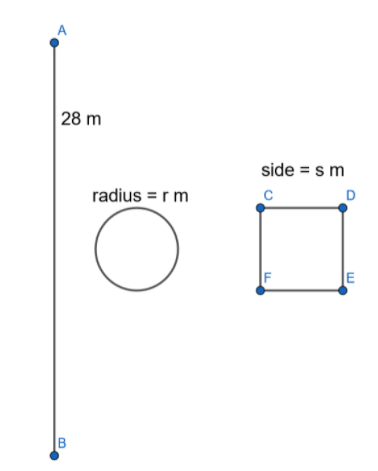Question
Question: A wire of length 28 m is to be cut into two pieces. One of the pieces is to be made into a square an...
A wire of length 28 m is to be cut into two pieces. One of the pieces is to be made into a square and the other into a circle. What should be the lengths of the two pieces, so that the combined area of the circle and the square is minimum?
Solution
To solve this question, we should note the point that the sum of the perimeter of the square and circumference of the circle is equal to 28 m. We know that the perimeter of the circle with side s m is 4s m and circumference of the circle with radius r m is =2πrm. We can write the relation as 2πr+4s=28 . The area of the circle =πr2 m2 and the area of the square =s2 m2 . By summing them up, we get A=s2+πr2 , A is the total area and we should write A in terms of any one of r and s using the equation 2πr+4s=28. Derive the area equation with respect to the variable available and equate it to zero to get the value of the variable for which we get the minimum area. Use this in the perimeter equation to get both the lengths of the square piece and circular piece.
Complete step-by-step answer :

In the question, the wire AB is of length 28 m is cut into 2 pieces and made into a circle of radius r m and a square CDEF of side s m.
Circumference of the circle =2πrm
Perimeter of the circle=4sm
As the length of the wire is constant, sum of perimeter and circumference is equal to 28 m.
2πr+4s=28
From this we can write r=2π28−4s→(1)
We are asked to find the minimum area. Let us write the area formed by 2 figures when radius = r m and side = s m.
Area of square=s2 m2
Area of circle=πr2 m2
Let us denote the total area as A. Total area A is given by
A=s2+πr2
Substituting the value of r from equation-1, we get
A=s2+π(2π28−4s)2
To get the extreme value of A, we have to differentiate A with respect to s and equate it to zero to get the value of s for which we get minimum area. Differentiating gives,
dsdA=2s+2π(2π28−4s)(2π−4)
Equating dsdA to zero, we get
dsdA=0=2s−2π112+2π16ss(2+π8)=π56s(π2π+8)=56s=8+2π56s=4+π28
For A to be minimum ds2d2A>0
ds2d2A=2+2π16 which is > 0 for all values of s.
By substituting the value of s in equation-1 we get,
2πr+4×4+π28=282πr=28−4+π1122πr=4+π112+28π−112
2πr=4+π28πr=4+π28π×2π1r=4+π14
The lengths of the two pieces are
Length of the square piece L1=4s=4×4+π28=4+π112
Length of the circular piece L2=2πr=2π×4+π14=4+π28π
∴The lengths of the square and circle are 4+π112 and 4+π28π respectively.
Note : Students can make a mistake by taking diameter in the circumference calculation and radius in the area calculation which leads to errors. While differentiating the area function, some students forget to differentiate (2π28−4s) and multiply it to the term 2π(2π28−4s) which leads to mistake. We have to first differentiate the whole function and then differentiate the term inside the function. The minimum area can also be calculated by substituting the calculated values of r and s in the area function.
